Free from the timetable of classes and meetings, and more meetings, I have given in to the temptation of Dendy’s classics and gone to several movies on Monday morning, while Kate goes off to good works. Today it was “Sunset Boulevard” (1950) With Gloria Swanson, William Holden, Erich von Stroheim, and Nancy Olson, along with Jack Webb (of Dragnet) before he got his teeth straightened. To see it on television is nothing compared to the wide screen: Marvelous. A very excellent print that gives us the crisp light and dark and many shades between that only black-and-white can do.
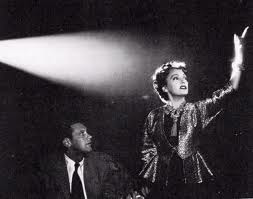
Leaving aside all the lore and gossip, the parade of celebrities, the contrivances of staging that swimming pool scene, after all that it is Gloria Swanson who dominates everything, and not just the scenes she is in, but through her presence manifested in the house and its furnishings, in the soul of von Stroheim, and seen or unseen clutching always at Holden. It offers a parallel love story of two women and one man. The man is Holden and the women are the aging relic Swanson and the fresh-faced ingenue Olson. He disappoints both because at his core, well, he has no core, though Olson shows him the way out and after he sacrifices himself to drive her away, he seems resolved to break the cancerous link with Swanson. Or is he…. we will never know.
It is a talkie, of course, and Swanson has some remarkable lines penned by the one and only Billy Wilder, and she by turns spits, drawls, mumbles, hisses, and declares them, all with lift of the chin, the bulge of the eyes, and turn of wrist. An Oscar does not seem a high enough award. With her increasing histrionics von Stroheim is the perfect foil, a rigidly controlled man whose unrequited love drives him to accept every humiliation with the merest flicker of an eyebrow.
Hollywood eats its own, and in 1973 Holden reprised this film in reverse as an older man captivated by a much younger woman who barely notices him in “Breezy,” and it was directed by Clint Eastwood.
No one ever says it better than the dean of movie reviews Roger Ebert:
http://www.rogerebert.com/reviews/great-movie-sunset-boulevard-1950
Cut-and-paste the link above to see his comments.
Month: July 2013
The Heart is a Lonely Hunter
Carson McCullers’s (1917-1967) first novel is The Heart is a Lonely Hunter (1940), a book that is often listed among the top twenty American novels. Yes, she was a prodigy, twenty-three when the book was published. Twenty when she started to write this detailed and absorbing study of varieties of loneliness in the five protagonists: John Singer the deaf mute, Biff the widowed cafe owner, Dr. Copeland the black physician, Jake the rootless labor organizer, and Mick the tom-boy of thirteen who is McCullers’s alter-ego. It is set in a wooded Georgia mill town of 30,000, remote and isolated in 1938-1939. How could McCullers with a high school education in Columbia, Georgia have breathed life into these five souls? Well, she could see Mick in the mirror, but even so that leaves the other four.
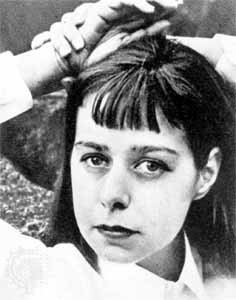
A brief glance at web comments indicates a learned debate about whether the central character is Singer, a confessional figure to whom each of the others turns for solace, or Mick who passes among them. She and Singer know them all, but they do not all know each other. Only someone with a PhD could fail to see that Mick is the unifying character into whose mind we see. Singer is indeed a sun that the others turn to for warmth but there is no interior. He is a silent blank onto whom others project what they seek, and he patiently accepts them for that. He is no messiah leading them to a promised land, but a reassuring confidante who accepts them as they are and let’s them talk. (He reads lips, and occasionally writes notes in response.) He is so compassionate he cannot live on this earth.
For the time and place the portrayal of Dr. Copeland is striking. A black man of dignity and forbearance who named one of his sons Karl Marx and the other Hamilton for Alexander Hamilton. But like the other principals Copeland can neither communicate nor connect with his children or anyone else. He oscillates between ice cold reason and blind anger. He certainly has cause to be angry.
When Copeland and Jake argue directly or indirectly about whether the root of all evil is racism or capitalism, the writer knows that both are right and that both are wrong. Racism and capitalism each have their evils, but neither is the root. The root is the people who do those evil things. Both are also right that religion plays no part. Religion is conspicuous by its absence in this novel.
When published this book did not make its way onto the shelves of many bookstores in Georgia. In its pages racism is the United States is likened to Nazi fascism. This is not a passing remark, but a repeated theme in the latter part of the novel. In her sympathy and insights in the lives of blacks she is far ahead of that other Southern prodigy William Styron though not to the bone as is William Faulkner.
Throughout, Biff keeps his prodigious file of newspaper cuttings organized by local, national, and international news. He follows the Munich negotiations with interest. The novel draws to a close with Biff filing the cuttings from 31 August 1939. (Germany invaded Poland on 1 September 1939 at that very time.)
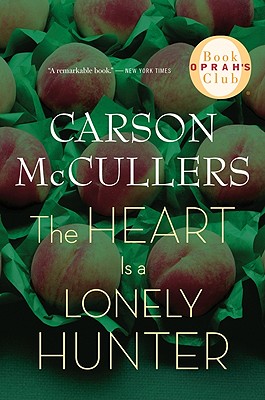
As is all her novels and most of her stories there is music. Here is one sample, Mick wanders around the town on hot summer nights and sits in the darkness outside open windows to listen to the radio in the homes of others. It seems she was unbeknownst to herself on a quest and what she sought was this:
“Then the music started. Mick raised her head and her hand went up to her throat. It was like God walking through the night. The outside of her suddenly froze and only that first part of the music was hot inside her heart. She could not even hear what followed, she sat there waiting and frozen, with her fists tight. After a while, the music come again, harder and loud. It was her, this music, walking in the daytime, in the hot sun. The music boiled inside her. She wanted to hang onto it, to all of it. The whole world was this music and she could not listen hard enough to remember it all. Then the opening music again, but this time with different instruments. It was like a hard hand had punched her. And then it ended. This music did not take a long time or short time. It had no time; it was time.”
This is Mick’s reaction to Beethoven’s Third Symphony (Eroica).
By the way, Mick listens at the windows of others because her family cannot afford a radio. Indeed the family is very hard up, and more than once Mick and her seven siblings go to bed hungry. Nothing is made of this in the novel. It is just the way it is, a fact of nature.
This edition is an Oprah BookClub selection. Hooray for Oprah! She and J.K. Rowling have done more good than all the blowhards at the ABC ever have. (I thought I would insert that reference to the ABC in to see if I get any blowback.)
McCullers was driven, and a reader senses that in these pages. The words on the pages burn with an urgency. She kept burning words until she died of a heart attack at age 50. A reader also senses the sorrow in those words. She wrote because she had to write. There is no cause; there is no effect. No label, racism or capitalism, means anything. The truth is that there is sorrow. There is neither relief nor rescue but life goes on.
I know there is a film but I feel no need to see it, and fear it would despoil this fragile creature, this novel. A part of me wants to read another McCullers novel, but another part wants to rest from the emotional despair that envelopes her pages.
Stilwell and the American Experience in China (1970)
A superbly researched and written study of Chinese and American relations during World War II told through the experiences and career of Joseph Stilwell, who first went to China in 1911 and left in 1944. He was a twenty-eight year old lieutenant when he arrived and a sixty year old four star general when he left. The book is detailed in its 530 pages of text and supplemented with nearly a hundred more pages of appendices and notes. Tuchman wears her scholarship lightly and the book reads itself. There is far too much to summarize so I offer a few conclusions.
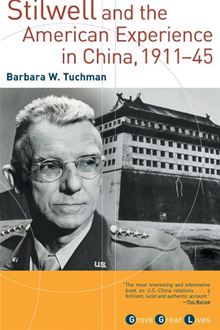
First as to China, the inescapable fact is that Chiang Kai-Shek was a warlord who pretended to be the national government, and credulous and desperate Americans accepted that claim. The credulous spoke no Chinese and did not venture beyond Chiang’s court. They included diplomats, journalists, missionaries, business men, and soldiers. The desperate wanted to keep China in the war to hold down the Japanese occupation force estimated at one million men who would not then be fought in the Philippines or Malaya. They included FDR and George Marshall. FDR long nursed the hope that China would emerge as a friendly great power in Asia after the war, and was willing to pay an enormous price toward that end until even this great optimist gave up on Chiang.
What distinguished Chiang from the other warlords who ruled fiefdoms when the dynasty decayed and collapsed was his pretentious claim to the nation (over the corpse of Sun Yat-Sen) and Madame May Chiang, a Wellesley graduate, who acted as his press agent to good effect. They affected Western ways and talked airly of sovereignty and democracy while their death squads reduced the competition. Think of Ann Coulter with a Uzi.
What Chiang wanted was to stay out of the war and let the barbarians fight each other, the barbarians being Japan and the Allies (Britain, USA, and Holland). Invaders come, the Manchu, the Mongol, but then they go. Insofar as he had a strategy it was to retreat and retreat until that happened, and then to reassert his authority by being on the winning side.
To reassert his power he needed the material wealth of American Lend-Lease which he took as a gift and offered no lease in return. Rather he cached this wealth for inevitable conflict with the Communist Chinese in the distant north. The Communist being Chinese were the real threat. To secure American largesse and protection to some degree, Chiang went through the motions of fighting the Japanese. At times this took the form of press statements describing gigantic battles in which the noble Chinese defeated, against all odds, the Japanese. The credulous took these press releases at face value. Stilwell did not.
Stilwell went to the alleged battlefields to see for himself, and he knew the lies for what they were. But because of the desperation to keep Chiang, read China, in the war, Washington did nothing, and there was probably nothing that could be done.
Turning then to the man: Stilwell loved and hated China. He had a facility and interest in languages before he went to China, and there he learned Chinese and became fluent. He was a driven man, restless, energetic, determined, smart, and over the years very knowledgeable of China and Chinese. He was also tactless and volatile, and Chiang was a ready catalyst. Stilwell came to despise Chiang and to see the Kuomintang regime as a nearly impotent fascist dictatorship – a message no one wanted to receive in Washington. True to his calling Stilwell as a soldier tried to make the best of the bad marriage, often by staying as far away from Chiang as possible, in Burma.
He did try to paper over the cracks for the sake of the war effort. Witness this picture, three people who hated each other smiling for the camera, which certainly does lie. (I say it this way because one infers from Tuchman’s pages that there was little love-lost between Madame Chiang and her husband; it was a family alliance.)
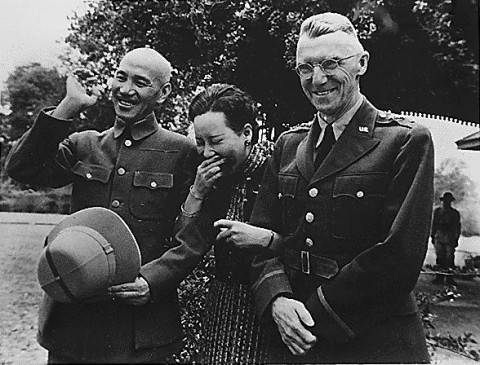
In Burma Stilwell did the impossible. He built the Burma Road over impossible terrain after having been told by British colonial officials it was impossible, technically, politically, and militarily. He created an army out of the rejects Chiang let him have, hoping that he would fail and be recalled to be replaced by a more compliant officer. This army defeated the Japanese and drove them out of Burma again after being told it was impossible by the British, whose principal interest was to retain the colonies after the war, not to fight Japanese.
Stilwell found the Chinese soldier cheerful, durable, quick to learn, and responsive to leadership. A hopeless generalization of course: ‘the Chinese soldier.‘ Stilwell respected Chinese people as much as he despised the warlords who misruled them. And that respect is part of what kept him in China. He could have left at nearly anytime by asking to be relieved.
Stilwell was a leader, of that there is no doubt. He was creative and resourceful, using what he had, starting where he was, and doing what he could. If the Chinese troops were untrained he would train them, and he did that sometimes personally, lying on the rifle range with recruits showing the action of the rifle. If they were hungry he would find food for them. If they were wounded he would supply doctors, nurses, and medicine. If they were low on ammunition he would get it somewhere, somehow. The miracles were daily.
Perhaps the most famous example is the best. When defeated by the Japanese the first time, he led his headquarters staff of 114 on a walk out of the northern Burmese jungles. He was a gruelling task master on the walk at 105 paces a minute. He was a tyrant over the food and water, and all but assaulted stragglers. As the Commander-in-Chief he was expected to fly out and direct the retreat from India, but Stilwell wanted to show to his defeated troops that he was one of them, one with them and so he walked just like they did. Their fate was his fate.
On he went at 105 paces a minute, at the end of the walk most of the 114 men hated him, and that was a tribute to Stilwell, because all 114 of them survived. Not one was lost on the two weeks in the circle of hell through which they walked. Rain, jungle, no road, no maps, dehydration, no local guides, no porters, Japanese planes, out of touch, occasional rifle fire from Japanese patrols, exhaustion, wildlife, malnutrition, and disease; the list goes on.
Stilwell ate with his men, ate what they ate. He stood in line at the mess tent for food or for the barber’s chair. He wore one set of clothes until they rotted away. He seldom wore the stars of his rank. When he did it was to show the soldiers that their general was there with them. When he went to Chiang’s court he borrowed a uniform because he had none. He carried a rifle in Burma and used it more than once. When he sent men on forced marches through terrible terrain, he went with them to see for himself what it was like. He accepted the promotions and medals that came without ceremony, no photographers present to immortalize his genius recognized. The only medal he valued was the Combat Infantry Man’s Badge, the only general to earn this medal. He was holding it when he died about a year after he left China.
The warlord generals, including Chiang, were not like this. In defeat Stilwell became something of a legend in the minds of many Chinese solders and this made him all the more frightening to Chiang. After that first encounter with the Japanese, Stilwell publicly admitted defeat and silently vowed to return, which he did without the histrionics of Douglas MacArthur.
The puzzle of Chinese politics gave the red baiters in post-war American politics much with which to play. Stilwell was duly blamed for not giving Chiang enough support (material) and for concentrating on fighting the Japanese rather than heading off the Communists, etc. Such hindsight as is given to the gods. All drivel to be sure, but it happened, as much drivel still does. Check the news today.
George Marshall figures in much of this story and as always seems to be both a pillar of strength and a sage. I single him out since I reviewed a biography of him earlier on this blog.
John Stuart Mill said one man with an idea can do a lot. Stilwell was such a man. His idea was that the Chinese deserve better than Chiang and his kind. His example also shows what one person with enormous energy and good will cannot do: the impossible.
His story has parallels with others. In the Peloponesian War Sparta sent one man, the general Brasidas, to northern Greece and he, too, very nearly won the war. Stilwell was that Spartan.
